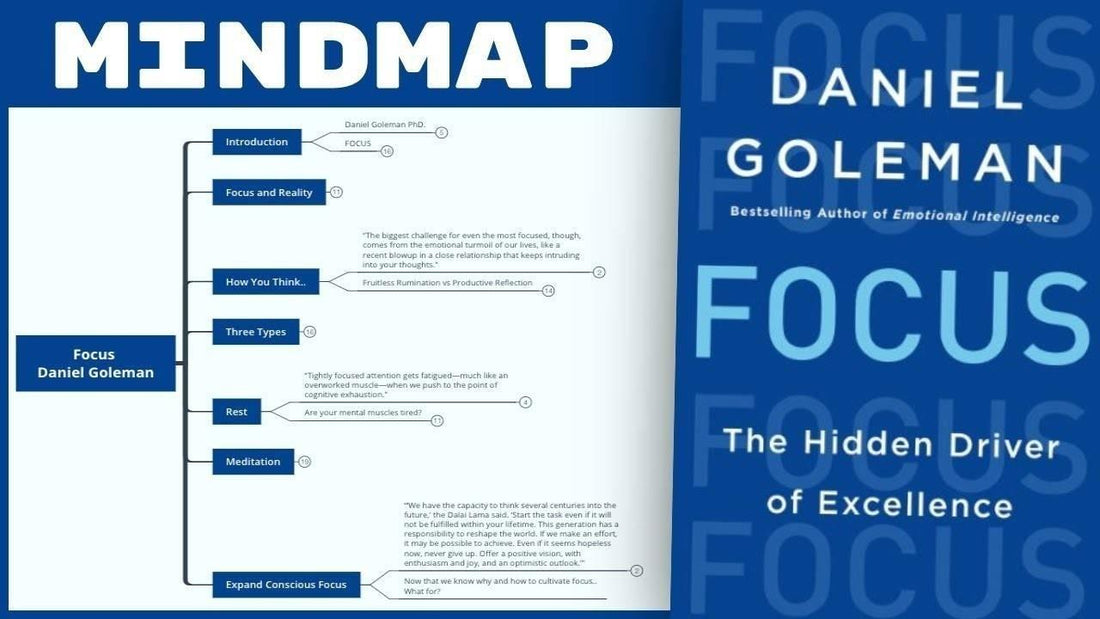Video Book Summary
Download all of the Mind Maps here.
Book Summary Notes
FOCUS
“In very recent years the science of attention has blossomed far beyond vigilance. That science tells us these skills determine how well we perform any task. If they are stunted, we do poorly; if muscular, we can excel. Our very nimbleness in life depends on this subtle faculty."
"While the link between attention and excellence remains hidden most of the time, it ripples through almost everything we seek to accomplish."
"This supple tool embeds within countless mental operations. A short list of some basics includes comprehension, memory, learning, sensing how we feel and why, reading emotions in other people and interacting smoothly. Surfacing this invisible factor in effectiveness lets us better see the benefits of improving this mental faculty, and better understand just how to do that."
"Through an optical illusion of the mind we typically register the end products of attention—our ideas good and bad, a telling wink or inviting smile, the whiff of morning coffee—without noticing the beam of awareness itself."
"Though it matters enormously for how we navigate life, attention in all its varieties represents a little-noticed and underrated mental asset. My goal here is to spotlight this elusive and underappreciated mental faculty in the mind’s operations and its role in living a fulfilling life.”
Science of Attention
Daniel says here in this opening remark that the skills related to attention are what determines how well we perform any task. Tasks related to memory, learning and performance all rely on attention.
However we often only notice the end result of our attention..
- The things we've learned
- Ideas we've had
- Our performance
Focus and Reality
“Attention, from the Latin attendere, to reach toward, connects us with the world, shaping and defining our experience."
"‘Attention,’ cognitive neuroscientists Michael Posner and Mary Rothbart write, provides the mechanisms ‘that underlie our awareness of the world and voluntary regulation of our thoughts and feelings.’"
"Ann Treisman, a dean of this research area, notes that how we deploy our attention determines what we see. Or as Yoda says, ‘Your focus is your reality.’”
Foundational Insight
For me this is a foundational insight into the book.. The one big thing you need to take away!
- What you focus on is your reality..
- Focusing on bad news and pain in the world? That's what you'll see!
- Focusing on beauty and love? That's what you'll see!
This is deeply connected with how your values and beliefs about the world.. They in some ways dictate what you see in the world!
- Good news is that we have control of our attention!
- Choosing to pay attention to things that empower us is possible for everyone..
How You Think..
“The biggest challenge for even the most focused, though, comes from the emotional turmoil of our lives, like a recent blowup in a close relationship that keeps intruding into your thoughts."
"Such thoughts barge in for a good reason: to get us to think through what to do about what’s upsetting us."
"The dividing line between fruitless rumination and productive reflection lies in whether or not we come up with some tentative solution or insight and then can let those distressing thoughts go—or if, on the other hand, we just keep obsessing over the same loop of worry.”
Fruitless Rumination vs Productive Reflection
Fruitless Rumintation
- Rumination is when the same thoughts come up time and time again in our minds
- Generally it's a painful thought we are having and it's the way our mind is trying to get us to deal with them..
- But if we don't deal with them they will keep coming up..
I've found this to be a common occurrence for me.
Also I've noticed that each time the thoughts come back they seem bigger and hairier.. Making me thing my mind is trying to help me solve the problem!
Productive Reflection
- Reflection is when we look back on a thought and think.. How can I solve that?
- During Productive Reflection we can say to ourselves.. What can I change now about this situation?
- Ps. Sometimes it's a simply as.. "Can't change it need to move on"
Which are you doing?
- What's stressing you out lately?
- Are you thinking about the same thing over and over in a subconscious attempt to get you to fix it?
- Or are you looking for solutions to help you move on and learn from your experiences?
Three Types
“How we focus holds the key to willpower, says [Walter] Mischel. His hundreds of hours of observation of little kids fighting off temptation reveals ‘the strategic allocation of attention,’ as he puts it, to be the crucial skill."
"The kids who waited out the full fifteen minutes did it by distracting themselves with tactics like pretend play, singing songs, or covering their eyes. If a kid just stared at the marshmallows, he was a goner (or more precisely, the marshmallow was)."
"At least three sub-varieties of attention, all aspects of the executive, are at play when we put self- restraint against instant gratification."
"The first is the ability to voluntarily disengage our focus from an object of desire that powerfully grabs our attention. The second, resisting distraction, lets us keep our focus elsewhere—say, on fantasy play—rather than gravitating back to that juicy whatever. And the third allows us to keep our focus on a goal in the future, like the two marshmallows later. All that adds up to willpower.”
Willpower
Almost everyone has heard of the marshmallow test before.. But here we have some real actionable advice!
- Every time I've heard the marshmallow story it felt like.. "If you ate the marshmallow as a kid you're doomed"
- Instead here we have real insight into what the kids who didn't eat the marshmallow did in order too enhance their willpower!
The Three Types of Focus
- A tool to enhance willpower
- Step 1: Take attention off temptation
- Step 2: Put your focus elsewhere
- Step 3: Focus on your vision for the future
What kinds of things do you struggle with when it comes to willpower?
- Try practicing these three steps in your mind!
- This is a powerful tool to help you accomplish goals..
Rest
“Tightly focused attention gets fatigued—much like an overworked muscle—when we push to the point of cognitive exhaustion."
"The signs of mental fatigue, such as a drop in effectiveness and a rise in distractedness and irritability, signify that the mental effort needed to sustain focus has depleted the glucose that feeds neural energy."
"The antidote to attention fatigue is the same as for the physical kind: take a rest. But what rests a muscle?"
"Try switching from the effort of top-down control to more passive bottom-up activities, taking a relaxing break in a restful setting. The most restful settings are in nature, argues Stephen Kaplan at the University of Michigan, who proposes what he calls ‘attention restoration theory.’"
"Such restoration occurs when we switch from effortful attention, where the mind needs to suppress distractions, to letting go and allowing our attention to be captured by whatever presents itself. But only certain kinds of bottom-up focus act to restore energy for focused attention. Surfing the Web, playing video games, or answering email does not.”
Are your mental muscles tired?
Many of us are working 8+ hour days in very focused professions..
- Most of us know that we're not really getting 8+ hours of focused attention out there..
- What Goleman says here is that rather than spending that 8+ hours at a medium level of attention because our attention muscles are overworked we should spend a few hours restoring them to their full capacity..
That means that the ability to focus is important (as stated before) but the ability to unfocus is just as important!
What is unfocusing?
• Not a term found in the book but essentially I think of unfocusing as turning the mind off..
• Allowing our attention to disperse and rejuvinate because of it!
How to unfocus?
• Goleman points out that studies show the best way to relax your focus muscles is to be out in nature..
• For me this looks like a few 10 minute walks a day and then a one hour walk when my day is done!
• This has been transformative to my daily life..
Meditation
“Think of attention as a mental muscle that we can strengthen by a workout."
"Memorization works that muscle, as does concentration. The mental analog of lifting a free weight over and over is noticing when our mind wanders and bring it back to target."
"As in any workout, the more reps the stronger the muscle becomes. More-experienced meditators, one study found, were able to deactivate their medial strip more rapidly after noticing mind wandering; as their thoughts become less ‘sticky’ with practice, it becomes easier to drop thoughts and return to their breath."
"There was more neural connectivity between the region for mind wandering and those that disengage attention. The increased connectivity in the brains of long-term meditators, this study suggests, are analogous to those competitive weight lifters with the perfect pecs.”
Meditation is Helpful on So Many Levels
First it's a great way to notice your thoughts..
- Are your ruminating or solving problems as we talked about before?
- Are your thoughts really your thoughts?
Second and more in line with this book is it's ability to sharpen your attention..
- "The mind is like a blade and the breath is like a wetstone"
- Goleman points out here how meditation can help you increase your ability to focus..
- That leads to all sorts of positive benefits we've talked about before!
New to mediation? Here is one technique.
- Box Breathing
- First breathe in for a one count
- Second hold for a one count
- Third breathe out for a one count
- Fourth hold for a one count finishing the box
- Fifth repeat adding one second to each phase until too difficult and go back down
Expand Conscious Focus
“‘We have the capacity to think several centuries into the future,’ the Dalai Lama said. ‘Start the task even if it will not be fulfilled within your lifetime. This generation has a responsibility to reshape the world. If we make an effort, it may be possible to achieve. Even if it seems hopeless now, never give up. Offer a positive vision, with enthusiasm and joy, and an optimistic outlook.’"
"We must ask ourselves: in the service of what exactly are we using whatever talents we may have? If our focus serves only our personal ends—self-interest, immediate reward, and our own small group—then in the long run all of us, as a species, are doomed."
"The largest lens for our focus encompasses global systems; considers the needs of everyone, including the powerless and poor; and peers far ahead in time. No matter what we are doing or what decisions we are making, the Dalai Lama suggests these self-queries for checking our motivation: Is it just for me, or for others? For the benefit of the few, or the many? For now, or for the future?”

